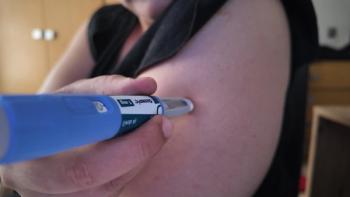
Live Classes Teach Patients and Caregivers What to Expect During Treatment
Nurse educators are more effective than electronic guides in ensuring that patients with cancer are safely discharged from the hospital without readmissions, a study found.
Live teaching sessions seem more promising than a library as a way of teaching patients and their caregivers about issues such as symptom management, infection prevention and chemotherapy safety, a group of nurses from Penn State Health Hershey Medical Center determined in a study.
Lead author Julianne Jordan, B.S.N., RN, OCN, presented the findings at the ONS 44th Annual Congress in Anaheim, California, April 13.
The need for education to help patients understand their disease, treatments and related challenges has been long established, as it is known to help prevent unexpected hospital readmissions and minimize complications, the study’s authors pointed out. Patient education can also decrease patient anxiety, enhance the ability to manage side effects, and ensure safe discharges, Jordan said. However, in the inpatient setting, bedside nurses struggle to find enough time to assess gaps in patient and caregiver education and reinforce the necessary messages, the team noted.
As a result, last year, the education council for Hersey Medical Center’s 39-bed oncology unit designed a patient and family resource room that offers evidence-based, standardized and self-guided educational materials that are always accessible. In addition to other materials, the room features a screen that shows PowerPoint presentations on a loop throughout the day, addressing a different topic each day of the week. Topics include skin, hair, nails and mouth care; pain management and the role of the palliative care team; chemotherapy safety at home; thrombocytopenia and neutropenia; explaining your cancer diagnosis; central line catheter care; and managing nausea and vomiting.
While this library helped close the educational gap, an informal assessment proved it was being underutilized.
As a result, the council developed a plan to offer live group education sessions twice a month for patients and caregivers in the resource room. Two bedside nurses are pulled from staffing for four hours on those two days to plan and instruct on topics of interest. The nurses make rounds and check with bedside nurses to identify patients and caregivers who would benefit from this education. They choose one or more topics according to the standardized patient education developed when the resource room was opened, but can tailor these depending on patients’ care plans. Sessions run for about 45 minutes, and when they conclude, patients and caregivers can ask questions, and all participants can learn from the answers.
Patients and caregivers fill out evaluation forms after the sessions and give feedback about the information that was offered. “Thus far, attendees have provided overwhelmingly positive feedback when asked if the topics were helpful and easy to understand,” the nurses wrote in an abstract.
The team determined that having a dedicated nurse provide education increases the amount of time spent on key concepts and reinforcement of knowledge. They concluded that, “Through implementation of live teaching sessions, clinical nurses are able to better meet the educational needs of patients and caregivers.”
Challenges in offering the program include making busy staff members available (although it helps for nurses to schedule their teaching days far in advance), timing the sessions so that they work for both nurses and patients, and controlling group discussions so that they don’t veer off topic, Jordan said.
While the institution is still evaluating the initiative, its ongoing goals will be a reduction in hospital readmissions, a decrease in infection rates and increased patient satisfaction, Jordan said.
The institution hopes to add more topics to the program, increase the number of sessions, get more staff involved and offer education prior to hospital admission for chemotherapy, she said.
Reference:
Jordan J, Melcher J, Carrillo MJ. Improving patient education: live teaching sessions in an inpatient hematology/oncology unit. Presented at: Oncology Nursing Society 44th Annual Congress; Anaheim, California; April 11-14, 2019. Abstract No. 5489.
Newsletter
Knowledge is power. Don’t miss the most recent breakthroughs in cancer care.


































